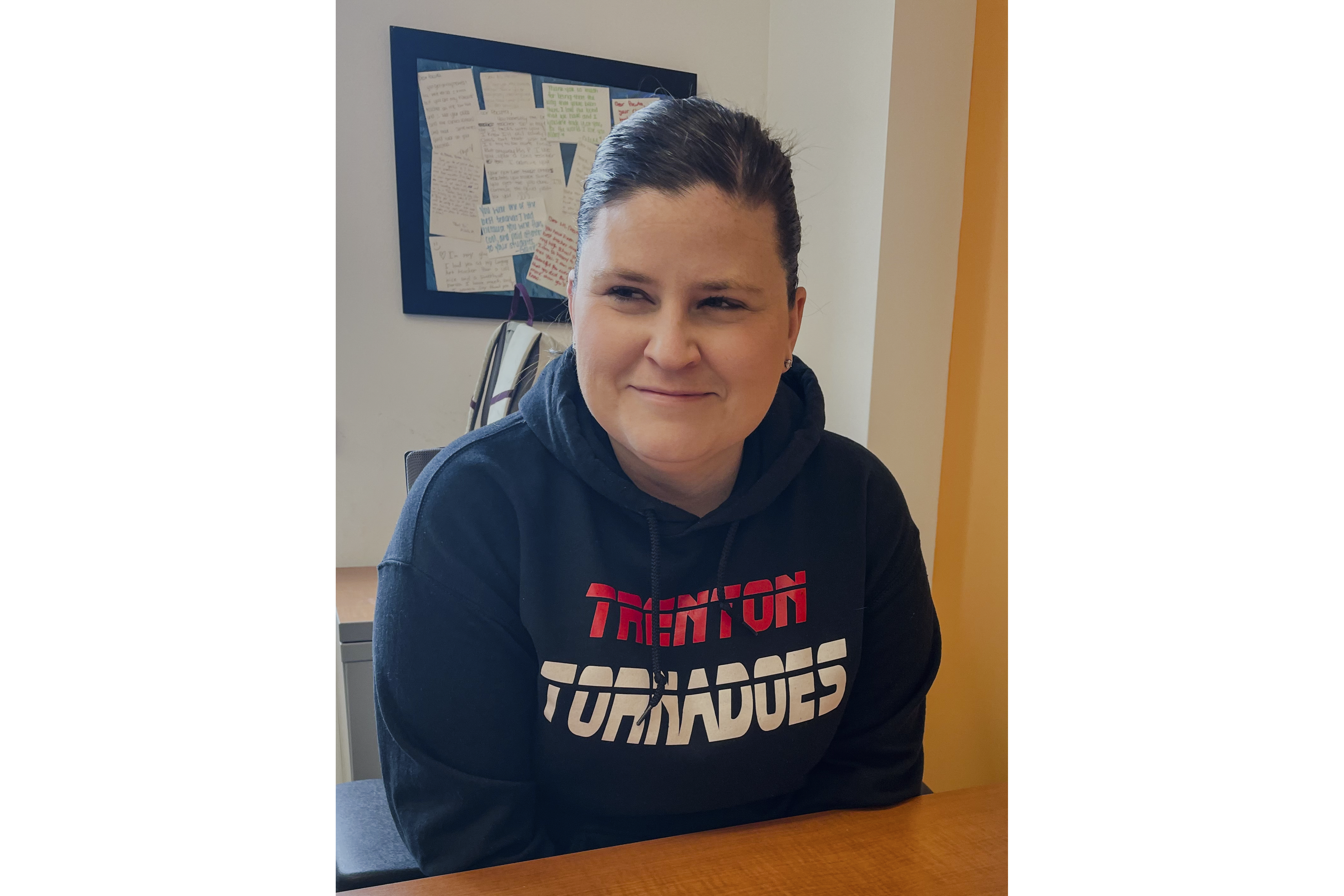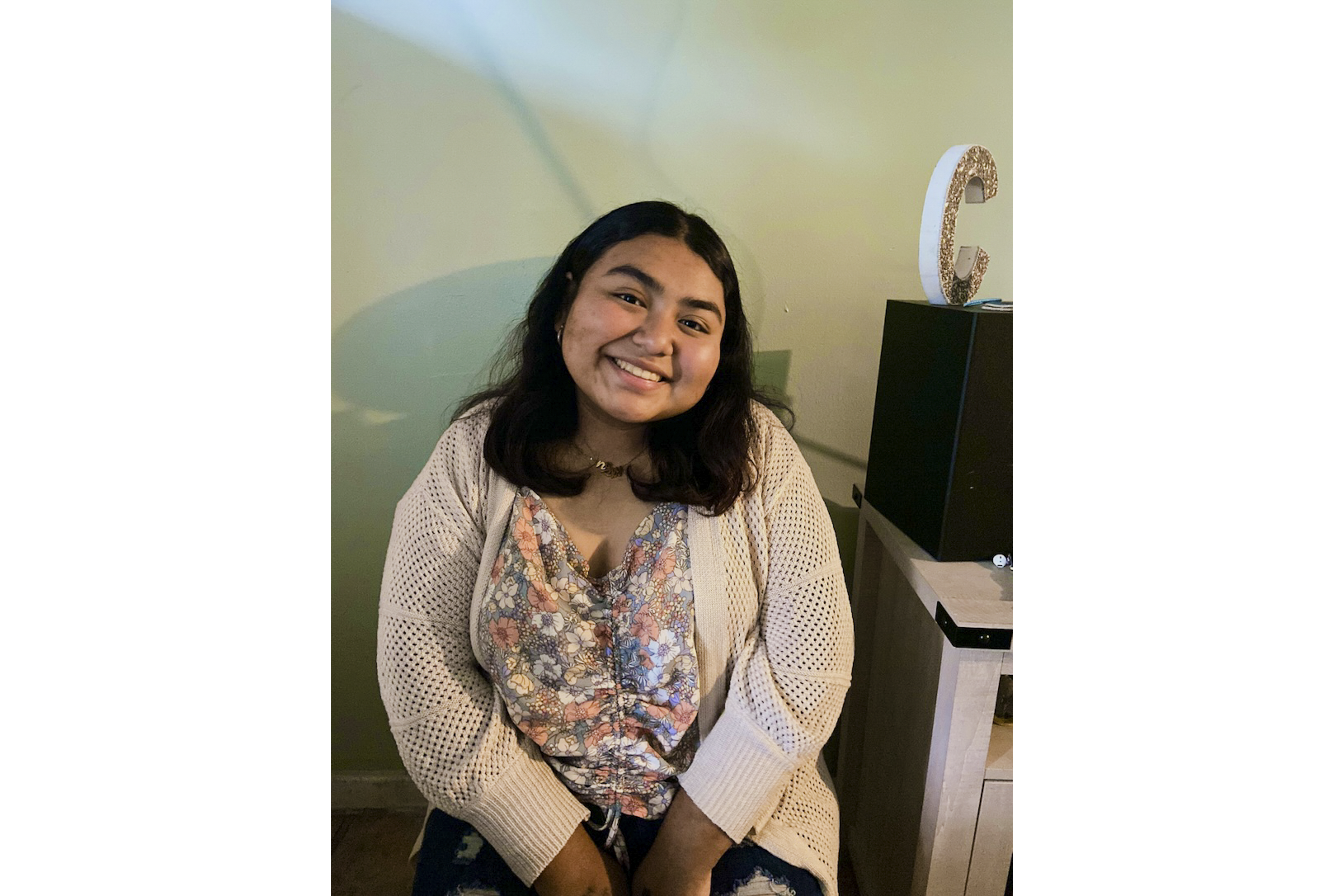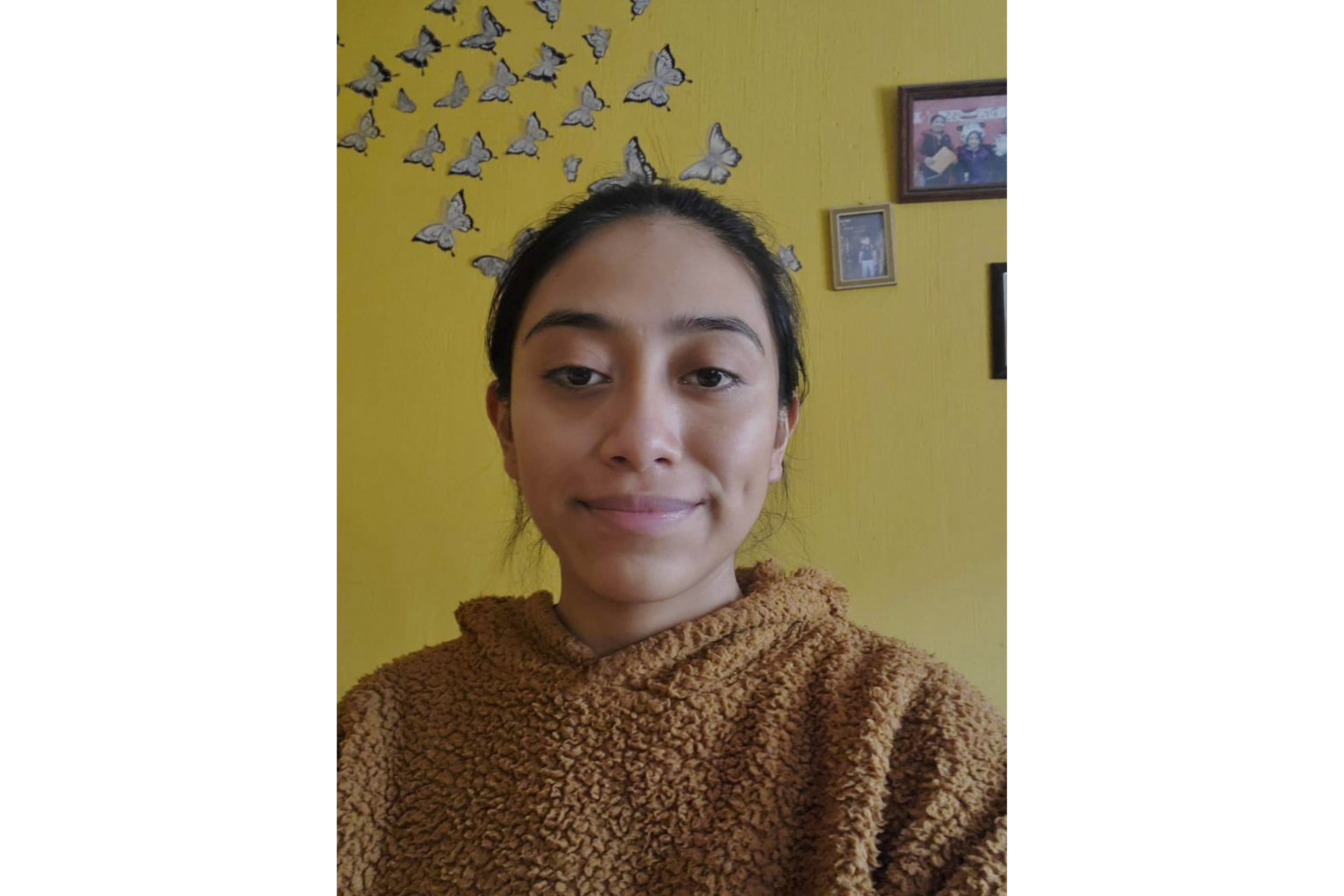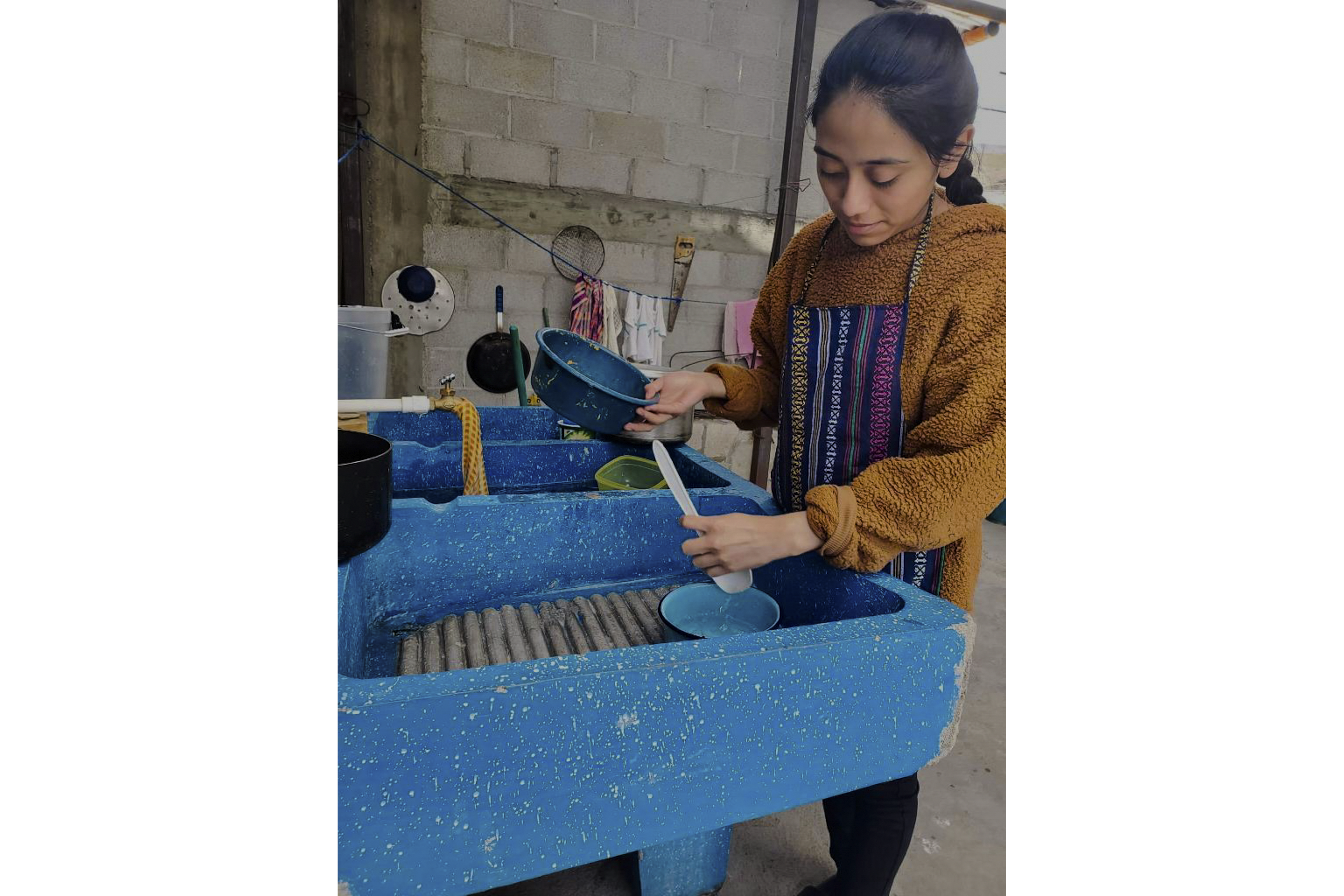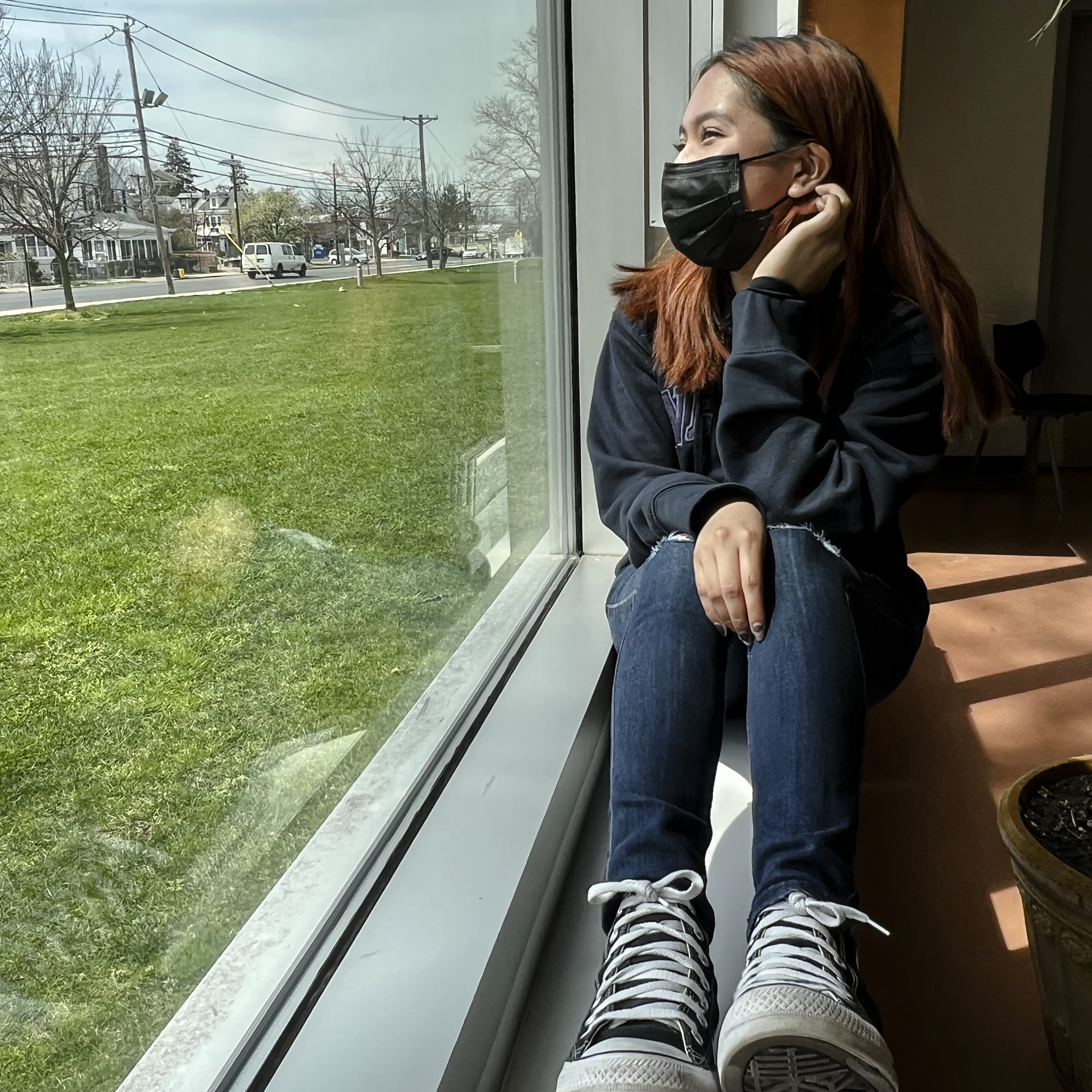
Melissa Pacaja
A young Mexican-Guatemalan woman
born and raised in New Jersey.
Personal History
Interview with Yulisa Gutierrez
Interview with Christine Pacuta
Interview with Nesly Orellana
"I feel as though many of my identities intersect, such as my culture and gender. I enjoyed learning more about them, because it is an intricate system that both leaves me privileged and oppressed."
Intro to Social Justice By Melissa Pacaja
TCNJ’s Intro to Social Justice was a course that delved into the system of inequality. The dynamics of power, and as a result of oppression. The intersectionality between differentiating identities and their effects on society were reviewed. Three interviews were to be conducted on three different people along with images for the final project. The interviews and images are meant to be a preservation of someone’s history. The stories being told in the interviews connect to the conversations held throughout the course, the systemic oppression, history in the communities, and their overall effects. The overall product of the final project connects to the idea of social justice as a whole.
For the final project of this course, we had to interview three different people. Intending to preserve a little bit of their history. The purpose of this project was to understand these different people. The questions ranged from social topics. Covering many points such as racism, sexism, ageism, classism, homophobia, and ableism. The overall reality of living in the twenty-first century. Similar to the class’s objective of Locust Hill African Cemetery and Museum, which focused on the preservation of lives affected during racial segregation.
The questions relate to the subjects discussed throughout the course. They are personal questions meant to dissect someone’s history with the systemic world around them. These are all people from different backgrounds and people with different experiences. Through these experiences, less history is hidden. Silence can cause narrative to be twisted “... how the silence and neglect of science can let truth utterly disappear or even be unconsciously distorted” (Jones, 33).
Questions can pertain from one's experience with concepts such as sexism to educational inequality. These questions relate to readings and events that the class experienced. For example Dr. Tony Keith who expressed his experience with racism through poetry. The photographs and interviews can express these difficult and intricate experiences. They are forms of art or social work used to present a message. Messages that convey equality and such. Concepts that focus on the power imbalance and or privilege that one group gains. The project opens a portal to view the power imbalance through a wider lens.
For my project I interviewed three different women in my life. A former teacher, my cousin, and my best friend. Ms. Pacuata was my Radicals Women Making History teacher for the third quarter of my sophomore year. She is a woman open to discussion specifically relating to change. The interview served to tell her story as a teacher in an urban setting and touched on topics that she is passionate about such as the school education system. Secondly, I interviewed one of my closest friends Nesly Jimenz. Her interview was meant to be more relatable. A younger perception of the world around us. My cousin Yulissa Gutierez was the last person to be interviewed. Yulissa lives in Guatemala, and I felt as though her interview was to tell the story of how it is to grow up in my country. The differences in culture and aspirations. All women focus mainly on sexism, and the effects of being a woman in today’s society. Sexism being a main concept in the system of inequality.
The final project was to interview different people in one's life. A form of activism of the lives present. Social Justice is work and activism that can challenge the borders between academic and activist work (Collins, Sirma, 63). Counter narratives change the entity of a story. The power of one’s voice disrupts the counter narratives created. The power of one’s voice creates an opening for the disruption of systemic oppression. For the voices of people without social power to be heard.
Bibliography
Adams, Maurianne, et al., editors. Readings for Diversity and Social Justice. Routledge, 2018.
Hannah-Jones, Nikole. The 1619 Project: A New Origin Story. Edited by Ilena Silverman, et al., Random House Publishing Group, 2021.
For the final project of this course, we had to interview three different people. Intending to preserve a little bit of their history. The purpose of this project was to understand these different people. The questions ranged from social topics. Covering many points such as racism, sexism, ageism, classism, homophobia, and ableism. The overall reality of living in the twenty-first century. Similar to the class’s objective of Locust Hill African Cemetery and Museum, which focused on the preservation of lives affected during racial segregation.
The questions relate to the subjects discussed throughout the course. They are personal questions meant to dissect someone’s history with the systemic world around them. These are all people from different backgrounds and people with different experiences. Through these experiences, less history is hidden. Silence can cause narrative to be twisted “... how the silence and neglect of science can let truth utterly disappear or even be unconsciously distorted” (Jones, 33).
Questions can pertain from one's experience with concepts such as sexism to educational inequality. These questions relate to readings and events that the class experienced. For example Dr. Tony Keith who expressed his experience with racism through poetry. The photographs and interviews can express these difficult and intricate experiences. They are forms of art or social work used to present a message. Messages that convey equality and such. Concepts that focus on the power imbalance and or privilege that one group gains. The project opens a portal to view the power imbalance through a wider lens.
For my project I interviewed three different women in my life. A former teacher, my cousin, and my best friend. Ms. Pacuata was my Radicals Women Making History teacher for the third quarter of my sophomore year. She is a woman open to discussion specifically relating to change. The interview served to tell her story as a teacher in an urban setting and touched on topics that she is passionate about such as the school education system. Secondly, I interviewed one of my closest friends Nesly Jimenz. Her interview was meant to be more relatable. A younger perception of the world around us. My cousin Yulissa Gutierez was the last person to be interviewed. Yulissa lives in Guatemala, and I felt as though her interview was to tell the story of how it is to grow up in my country. The differences in culture and aspirations. All women focus mainly on sexism, and the effects of being a woman in today’s society. Sexism being a main concept in the system of inequality.
The final project was to interview different people in one's life. A form of activism of the lives present. Social Justice is work and activism that can challenge the borders between academic and activist work (Collins, Sirma, 63). Counter narratives change the entity of a story. The power of one’s voice disrupts the counter narratives created. The power of one’s voice creates an opening for the disruption of systemic oppression. For the voices of people without social power to be heard.
Bibliography
Adams, Maurianne, et al., editors. Readings for Diversity and Social Justice. Routledge, 2018.
Hannah-Jones, Nikole. The 1619 Project: A New Origin Story. Edited by Ilena Silverman, et al., Random House Publishing Group, 2021.
English Translation
Where are you from?
I am from Guatemala, Quetzaltenango.
And how did you grow up in Quetzaltenango?
I grew up with a very beautiful childhood. Since I had many friends when I was little, we played in the afternoons, I shared with my brothers, with my mom. I grew up and had more friends which made me very happy and helped me a lot since I had different thoughts and different goals. And then from there I took several positive things from them and then I became the person I am now.
How old are you?
I am twenty years old
What do you work as?
At the moment I don't work, I only study at the university in business administration, since studying takes a lot of time... So I had to decide to study and not work.
What was your experience in college or what is it still?
The university is very… Well, it has been a very nice experience, even if it is not face-to-face since classes are virtual due to Covid-19. But now the university has tried to make it dynamic where one learns and doesn't get bored. So it has been a very nice experience and it will continue to be.
What is a special memory in your life?
For me a special memory in my life is a moment where I share with my family, with friends. We had fun, we talked, we gave each other advice. For example, a very beautiful memory of my life was when I traveled with my family to the Chicabal lagoon here in Quetzaltenango, since it was a moment where we walked, talked, laughed, and we met in a very beautiful place. So that is a special memory in my lifetime.
Who are the most important people in your life? And why?
For me, the most important people in my life are my mom, my brothers, my aunts, my cousins, since many times… as… teenagers or I don't know, as older people, we feel a lot of pressure. So they are there to listen to me, advise me. They give me good advice, and in the bad times even the good times they are always there with me, and they always support me
What are goals or dreams you have in your life?
Goals and dreams are… it is a result that I want to achieve in the long term. How am I going to achieve it? By studying, since that will help me with everything, to do many things in all of life because it will open doors for me to be able to work, to be able to continue studying. So I want to have many goals and dreams in life which can have economic and emotional stability.
And what is a saying you live by?
One of the sayings that I take into account the most is that of “There are no bad decisions, if not actions that bring you closer or further away from your purpose. “ This is said because many times we make the decision, say to study or to work, then sometimes at that moment we act without thinking about things, and it does not turn out the way we want. So we think we made a bad decision, and it's not like that, we just don't act maturely and we don't know how to face our problems. So we say that the decisions we made were bad when they were not.
What is something interesting about you?
One of the most interesting things is that I like to cook, I really like baking. I like to make cakes and all kinds of foods that seal sweets.
And what is a fight or cause that you believe in? And why?
A struggle in which I believe and feel that it is right is that of reaching a consensus among people to take care of the environment. Because we are living in an era where water is scarce, where it no longer rains. where there is about global warming. So for me this cause is very important because it helps make people aware that we are destroying the planet, and it is the only one we can inhabit. I believe in it because it will also help us to provide a better future for the people who will answer for us.
And what has been your experience growing up and living in Guatemala?
Well, it has been a very nice experience, despite the fact that there are not many work opportunities. There is still sexism and racism within people. Despite all that, it has been very nice because there are always friendly people with values, with traditions. which make us feel very good, make us feel at home.
What has been your greatest achievement? And because?
My greatest achievement has been being able to graduate with a degree. This has been my greatest achievement since I had many difficulties when studying this career. That I had to study with very sexist men, with men who did a lot of bullying. And then every day I focused more on what they were going to say, what they thought of me, or that they didn't want me in that group. So there were times when I got desperate, I didn't want to continue studying, I wanted to give up everything. But as I say, my family was always supporting me. They always told me to focus on myself and move on so I made it. So it's my greatest achievement
And in contrast, what has been your biggest challenge? And because?
My biggest challenge at the moment is to continue studying at the university since I have to focus a lot on my studies and many times I would like to be able to help my family financially, But sometimes studying takes up a lot of time. So I have to accept that I have to continue studying and not work. So that is quite a big challenge for me since I would also like to help my family but I know that studying I am going to do it too only that it will take time.
What is one way you make a difference around you and in your community?
One difference is that, well, here in my community there are people who no longer have or no longer have the values, who no longer speak, no longer say hello. So the difference that I make is that it doesn't matter if they greet me or not, I say good morning, good afternoon. More to older people who are the ones who hold more respect. And also cleaning my area where I live, not littering, always keeping it clean, and therefore always being aware that no one throws trash too.
To end the interview and to engage the class, what does social justice mean to you?
For me, social justice means many things, but one of the most important things for me is gender equality. That both men and women have the same opportunities because although we are in a very advanced century there is still a lot of sexism and a lot of racism. So for me. Social justice is where women have opportunities, such heavy work and without them having to stop being feminine. And also the men in which they can continue any type of work, or study, no matter what it is without being considered that they are no longer men. For me that is social justice and equality.
Spanish Transcript
¿De donde eres?
Soy de Guatemala, Quetzaltenango
Y como creciste en Quetzaltenango?
Crecí con una infancia muy bonita ya que tuve muchos amigos desde pequeña, jugábamos en las tardes, compartía con mis hermanos, con mi mama. Fui creciendo y tuve más amistades las cuales me hizo muy feliz y me ayudo mucho ya que yo tenía diferentes pensamientos y diferentes metas. Y entonces de allí agarre varias cosas positivas de ellas y pues me convertí en la persona que ahora soy.
¿Y cuantos años tienes?
Tengo veinte años
¿Y de qué trabajas?
Por el momento no trabajo, solo estudio en la universidad en administración de empresas, ya que estudiar lleva mucho tiempo... Entonces tuve que decidir estudiar y no trabajar.
¿Que fue tu experiencia en la universidad o que sigue siendo?
La universidad es una experiencia muy… bueno ha sido una experiencia muy bonita, aunque no sea presencial ya que por el Covid-19 las clases son virtuales. Pero ahora si la universidad la han intentado hacer dynamical donde uno aprende y no se aburra. Entonces ha sido una experiencia muy bonita y siguiera siendo.
¿Qué es un recuerdo especial en tu vida?
Para mi un recuerdo especial en mi vida es un momento donde comparto con mi familia, con amigos. Los cuales nos divertimos, platicamos, nos aconsejamos. Por ejemplo un recuerdo muy bonito de mi vida fue cuando viaje con mi familia a la laguna de Chicabal aquí en Quetzaltenango ya que fue un momento donde caminamos, hablamos, nos reímos, conocimos un lugar muy bonito, entonces eso es un recuerdo especial en mi vida.
¿Quiénes son las personas más importantes en tu vida? ¿Y por qué?
Para mi las personas mas importantes en mi vida son mi mamá, mis hermanos, mis tías, mis primos ya que muchas veces… como… adolescentes o no se como personas ya mayores sentimos mucha presión. Entonces allí están ellos para escucharme, aconsejar me. Me dan buenos consejos, y en los momentos malos incluso los momentos buenos siempre están allí conmigo, y siempre me apoyan
¿Qué son metas o sueños que tienes en tu vida?
Metas y sueños son… es un resultado que quiero lograr a largo plazo. Cómo lo voy a lograr pues estudiando ya que eso me va ayudar a todo, a realizar muchas cosas en todo la vida porque me va abrir puertas para poder trabajar, para poder seguir estudiando. Entonces quiero tener muchas metas y sueños en la vida los cuales pueda tener estabilidad económica y emocional.
¿Y Qué es un dicho por el que vives de?
Unos de los dichos que más tomó en cuenta es el de “No hay decisiones malas, si no acciones las que te acercan o te alejan de tu propósito.” Este dicho pues porque muchas veces tomamos la decisión, por decir estudiar o de trabajar, entonces a veces en ese momento actuamos sin pensar las cosas, y no nos sale como nosotros queremos. Entonces pensamos que tomamos una decisión mala, y no es así, simplemente no actuamos maduramente y no sabemos como enfrentar nuestros problemas. Entonces decimos que las decisiones que tomamos fueron malas cuando no fue así.
¿Qué es algo interesante de ti?
Una de las cosas más interesantes es que me gusta cocinar , me gusta mucho la repostrella. Me gusta hacer pasteles y todas clases de comidas que sellan dulces.
¿Y qué es una lucha o causa en la que crees en? Y porque
Yo creo que una lucha en la que creo y siento que esta bien es la de consensuar las personas a cuidar el medio ambiente. Porque estamos viviendo en una era en donde el agua esta escasa, donde ya no llueve. donde hay sobre calentamiento global. Entonces para mi esta causa es muy importante ya que ayuda a concientizar a las personas de que estamos destruyendo el planeta, y es el único que puedmos habitar. Creo en él porque también nos va ayudar para darle un mejor futuro para las personas que van a responder por nosotros.
¿Y que ha sido tu experiencia creciendo y viviendo en Guatemala?
Pues ha sido una experiencia muy bonita, pues a pesar de que no hay muchas oportunidades en este palliz de trabajo. Aun existe el machismo y racismo dentro de personas a pesar de todo eso ha sido muy bonito porque siempre hay personas amables con valores, con tradiciones. los cuales nos hacen sentir muy bien, nos hacen sentir como en casa.
¿Cuál ha sido tu mayor logro? ¿Y por qué?
Mi mayor logro ha sido el poder graduarme diversificado. Este ha sido mi ayor logro ya que tenía muchas dificultades a la hora de estudiar esa carrera. Que me tocó estudiar con hombres muy machistas, con hombres que hacian mucho bullying. Y pues cada dia yo me enfocaba más en lo que ellos iban a decir y que lo que opinaban de mi o que no me querían en ese grupo. Entonces hubieron momentos en el que me desesperé, no quería seguir estudiando, quería renunciar a todo. Pero como digo, mi familia siempre me estuvo apoyando. Siempre me dijeron que me enfocara en mí y que siguiera adelante entonces lo logré. Entonces es mi mayo logro
¿Y al contraste Cuál ha sido tu mayor reto? ¿Y por qué?
Mi mayor reto en este momento es el seguir estudiando la universidad ya que me tengo que enfocar mucho en el estudio y muchas veces quisiera poder ayudar económicamente también a mi familia. Pero a veces el estudiar me quita mucho tiempo. Entonces tengo que aceptar que tengo que seguir estudiando y no trabajar. Entonces ese es un reto bastante grande para mí ya que quisiera ayudar también a mi familia pero se que estudiando lo voy hacer también solo que me va llevar tiempo.
¿Cuál es una forma en que haces una diferencia a tu alrededor y en tu comunidad?
Una diferencia es que, bueno aquí en mi comunidad hay personas que ya no tienen o ya no poseen los valores, los cuales ya no hablan, ya no saludan. Entonces la diferencia que yo hago es que no importa si me saludan o no yo les digo buenos días, buenas tardes. Más a las personas mayores que son las que se les tiene más respeto. Y también limpiando mi área donde vivo, no tirando basura, siempre mantenerlo limpio, y pues siempre estar al pendiente de que nadie tire basura también.
Para terminar la entrevista y para relacionar a la clase, ¿Qué significa la justicia social para ti?
Para mi la justicia social significa muchas cosas, pero una de las cosas más importantes para mi es la igualdad de género. Que tanto hombres como mujeres tengan las mismas oportunidades porque aunque estemos en un siglo muy avanzado aún sigue existiendo mucho machismo y mucho racismo. Entonces para mí la justicia social es donde las mujeres tengan oportunidades. Trabajos así pesados y sin que ellas tengan que dejar de ser femeninas. Y también los hombres en que ellos puedan seguir cualquier tipo de trabajo, de estudio, no importa de lo que sella sin que sean considerados que ya no son hombres. Para mi eso es la justicia social e igualdad.
